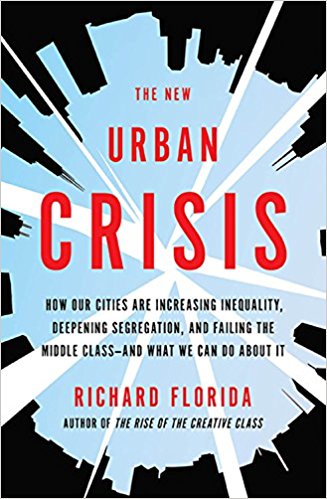You have /5 articles left.
Sign up for a free account or log in.
 The New Urban Crisis: How Our Cities Are Increasing Inequality, Deepening Segregation, and Failing the Middle Class — and What We Can Do About It by Richard Florida
The New Urban Crisis: How Our Cities Are Increasing Inequality, Deepening Segregation, and Failing the Middle Class — and What We Can Do About It by Richard Florida
Published in April of 2017.
Richard Florida’s insightful new book The New Urban Crisis can be read in two ways.
The first interpretation is that Florida responding to his critics that the secret to urban prosperity is to focus on attracting creative class employees and employers. The book is something of a mea culpa that Florida overestimated the ability of cultural amenities to drive urban success, and underestimated how the growth of urban knowledge economies can serve to drive economic inequality.
The second way to read The New Urban Crisis is from the perspective of someone based at a small liberal arts college, located in a small and rural college town. From this perspective - my perspective - this new book is a reminder that small town society needs its students, analysts, and thinkers just as much as urban America. Just as Richard Florida is one of our most prominent and influential urbanists and urban boosters, we need academics to fill the role as ruralists and boosters (and critics) of small town and rural life.
The New Urban Crisis does not represent a 180 degree turn in Florida’s Creative Class thinking. He still believes that cities would be smart to focus on cultural amenities - including good schools as well as bike paths and a vibrant artistic / restaurant scene - to attract highly educated creatives and the companies that wish to hire them.
Florida has concluded, however, that this approach to urban development does too little for the majority of city residents who are not highly educated creative knowledge workers. For service and working class residents (the majority of people living in cities), issues of housing affordability, public transportation, child care, and wages matter much more than cultural amenities.
Superstar cities, such as NYC and LA and DC and San Francisco, have thrived in the digital economy. They are the epicenter of the back-to-the-city movement, the destination of choice for a whole generation of young highly educated creative professionals. These superstar cities, however, are increasingly unaffordable for all but the most highly compensated.
For Florida, this is less a story of gentrification - as wealthy residents seldom directly displace lower income households. Rather, the new urban story is one of increasing inequality and separation - with wealthier residents living essentially separate lives than the service and working class members in which they depend.
Reading The New Urban Crisis will not dissuade young professionals from wanting to move to cities. Rather, the book may convince them that they need to pay attention to the needs of everyone in the city - and not just the other people they work with in their technology / design / medical / legal / publishing companies.
Who is writing the books about working and living in small town and rural America?
Small town college town seem to have many of the same advantages and challenges that Florida writes about in superstar cities. College towns seem to have many of the amenities that attract members of the creative class - including arts and recreational and educational opportunities - without some of the negatives of superstar city life. Housing affordability would probably be top on this list (although this may be uneven depending on the college location), but also a sense of community integration. College towns are simply not the sort of winner-take-all places that some big cities have become.
Can you point us towards some academics who are writing about the positive (and challenging) elements of small town and rural life?
Who are the students of college towns?
Do we have ruralists in the same tradition of urbanists like Richard Florida?
What are you reading?




